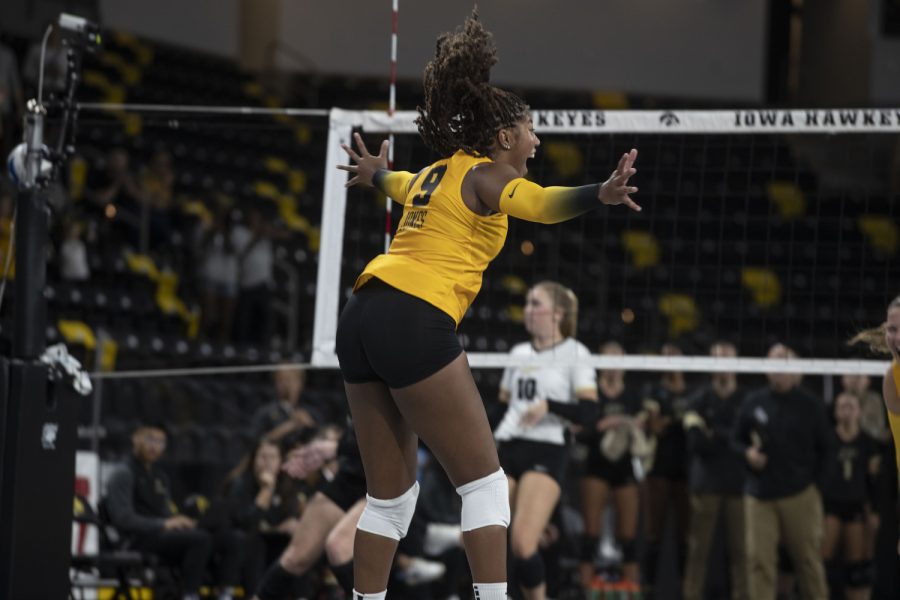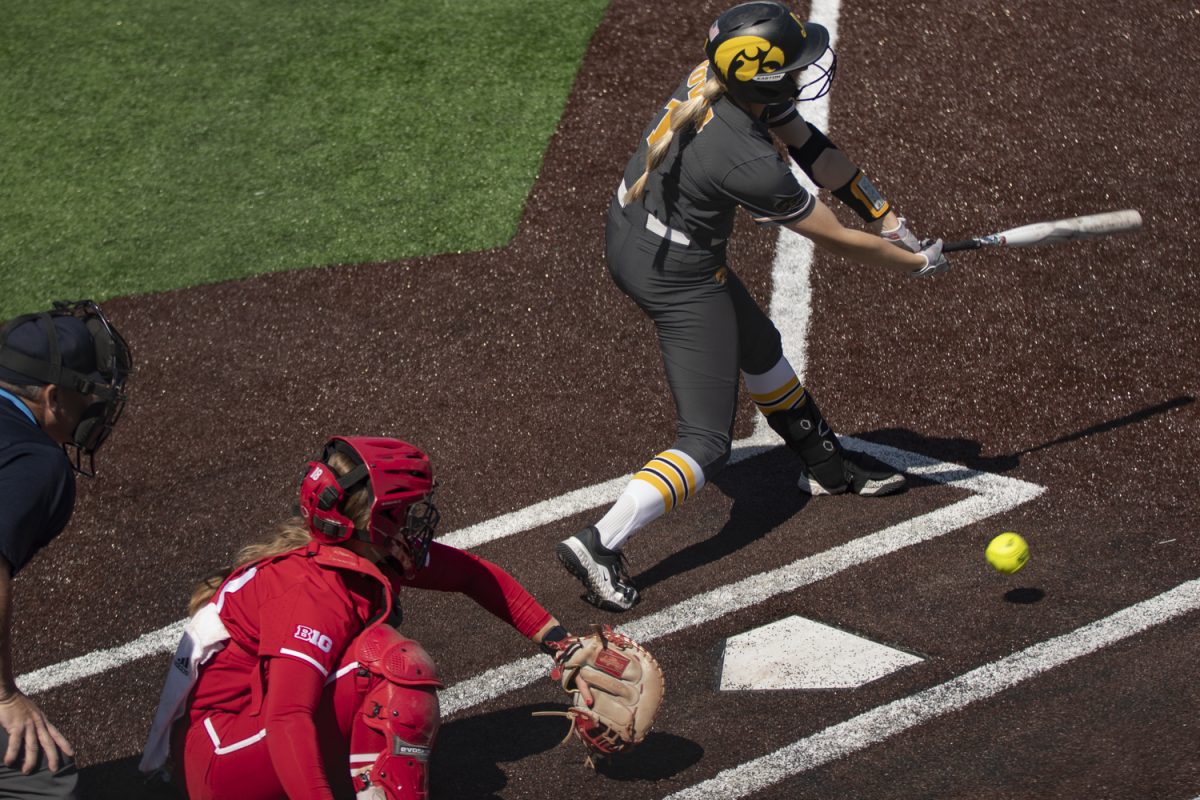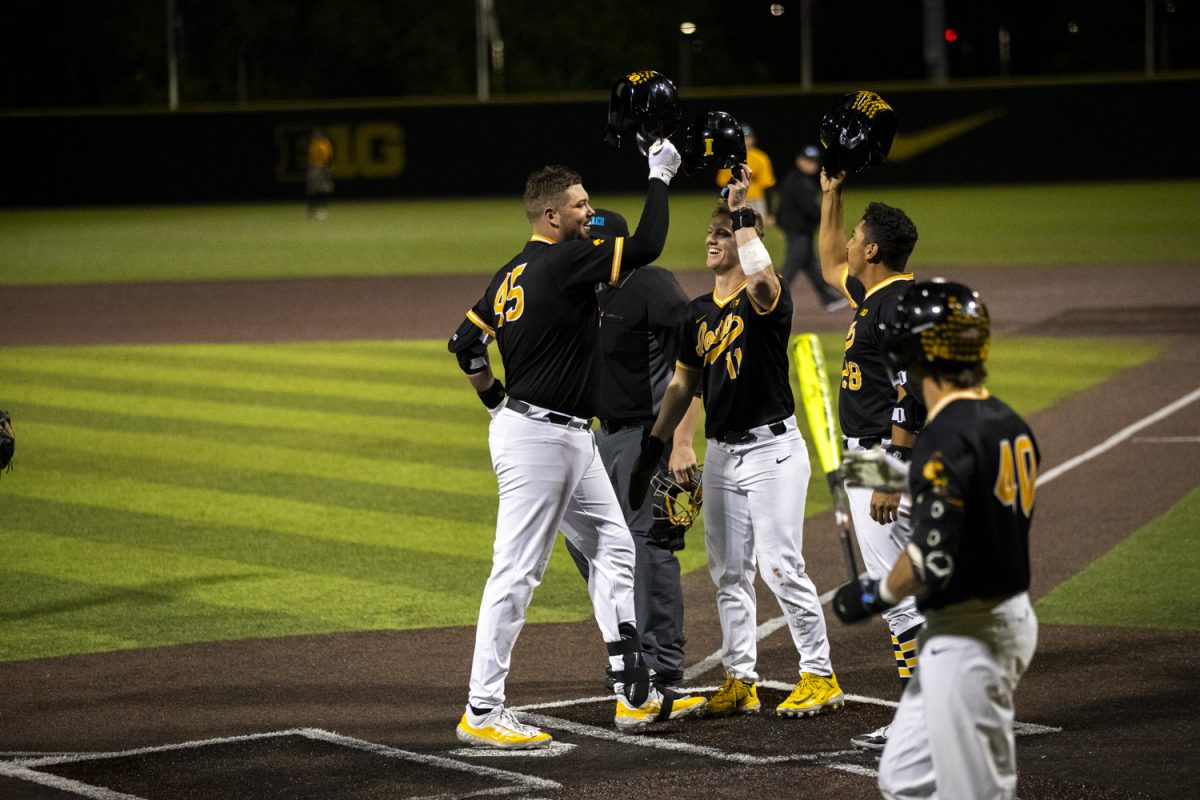Somewhere, protected in the bowels of a safety-deposit box in the Iowa City area, lie four Yankee World Series rings, nestled safely in a wool sock.
The rings don’t belong to a coach nor to a current or former player. Rather, the rings belong to a local — an Iowa City native. An unimposing fellow, who one wouldn’t expect to don the Yankee Pinstripes. Actually, he never did.
Dan Matheson, a University of Iowa instructor in Leisure Studies, was a key member of the Yankee organization for six years, from the 1996 to 2001 seasons, when the Bronx Bombers won World Series titles in 1996, 1998, 1999, and 2000.
“I never hit a ball or made a pitch, but it’s special. I knew where my place was,” Matheson said.
Before Matheson earned his way into one of the most successful sports organizations in the world, he interned for the Yankees during spring training in 1996 — while he was finishing up his final semester of law school at the University of Minnesota.
“I basically disappeared from law school for a full month,” Matheson said. “I went to Tampa, and I worked for a month, and I came back to finish my classes. I did no studying while I was in Tampa; I worked all the time. My goal while I was down there was to really make an impression on the organization.”
Make an impression he did. At the conclusion of spring training, Matheson was awarded a position within the organization — director of baseball operations.
Mark Newman, now the Yankee senior vice president of baseball operations, gave Matheson his opportunity with the Yankees as an intern during spring training and eventually offered him the full-time job.
Newman recalls Matheson’s work ethic during that period, along with his skin pigment.
“The biggest thing I remember is this young guy, not slightly built, coming from Minnesota, with kind of an unhealthy disregard of sunscreen and taking on a skin color that’s not seen often,” Newman said. “Then lugging these heavy pitching machines around in the hot sun and paying for it.”
As director of baseball operations, Matheson was tasked with handling the contracts of minor-league players and creating the budget for the player development scouting division. But one of his favorite aspects of his job, Matheson says, was sitting in on player-personnel meetings.
“There was a small group of baseball advisers [then-Yankee owner George] Steinbrenner relied on — Newman, [General Manager and Senior Vice President Brian] Cashman — when a decision had to be made. ‘Should we sign Manny Ramirez, should we sign Mike Mussina, Albert Belle, re-sign Andy Pettitte?’ When all those decisions had to be made, Steinbrenner would call meetings at any given time of six to 10 people, and we would hold these meetings in Tampa. My role in these meetings would be to crunch the budget numbers — luxury tax, those issues, I would present the numbers to Mr. Steinbrenner.”
Surprisingly, Matheson never spent any time in New York. Steinbrenner, a resident of the Tampa area even during baseball season, preferred to keep his front-office personnel in Florida because of his large, hands-on role in the organization. Steinbrenner sat in on many of the meetings that concerned the Yankees, and when the presence of people such as Cashman or Yankees President Randy Levine was required, Steinbrenner flew them down to Tampa from New York.
Eventually, Matheson said, he got worn out. The hours got too long. He needed a life outside the Yankees.
“[Leaving] was certainly an unconventional decision, because I had a great relationship with Mr. Steinbrenner, and my time with the Yankees was very good,” Matheson said. “I was reaching a point in my early 30s where I wanted to find a better work/life balance. When I worked for the Yankees, I worked for 350-355 days a year for six years straight. Every weekend, every holiday, no time off. That’s how everybody worked in the Yankees; that’s very much the baseball lifestyle.
“I enjoyed it while it lasted; it was exactly what I wanted to do at the point in my life. But I had other interests and hobbies in my life that were not being satisfied by that lifestyle.”
Matheson gave his notice to Steinbrenner and Newman and headed back home.
“He told me, and then he told George Steinbrenner that he was going to leave and going back to Iowa,” Newman said. “We missed him then, and we still do.”
Matheson came back to Iowa City, where he relaxed for six months before seeking employment once again. As he was tapping into his network of contacts, he was put in touch with the NCAA. Luckily for him, it was in a hiring phase, and Matheson was brought on board as an investigator for the NCAA in June 2002.
At the NCAA, Matheson looked into alleged major infractions at various universities. Because of the sensitive nature generally involved with such work, he said, he couldn’t disclose the specifics of what he did and did not investigate. But the process of conducting such an investigation at a school, as one can imagine, seems rather taxing.
When information arose alleging a major violation of NCAA rules, Matheson went to the school and investigated. The ideal end result would be the institution and the NCAA reach similar conclusions. If it turns out major violations have occurred, the investigator is responsible with describing those allegations to the school and presenting them to the NCAA infraction committee.
“The investigator’s job at one stage is kind of be the detective and at a later stage to be kind of like a prosecutor representing the NCAA on the committee of infractions — the NCAA’s version of a judge and jury,” Matheson said.
After six years with the NCAA, Matheson once again felt the call of Iowa. Initially, he thought he could obtain a job with the UI Athletics Department. But when he told that to his boss at the time, in 2008, he was presented with an offer to live and work in Iowa City while telecommuting with the NCAA in Indianapolis and traveling to investigate in between. The telecommuting option presented to Matheson, according to a colleague of his at the NCAA, was something unheard of in the organization.
“He’s the only person who’s been allowed to do that,” Director of Enforcement Stephanie Hannah said. “It speaks volumes of what we think about Dan at the NCAA. We know his work ethic — he’s a nose-to-the-grindstone type of guy. Because we valued him so much, we allowed him to work in Iowa City. Dan’s been the only person ever to be permanently working in a different location.”
“The organization is often criticized for not promoting student-athlete welfare, but from having spent nine years on that staff and working side by side with those people … it was an honor going to work every day with people who were so committed and really believed in what they were doing,” he said. “Ultimately, the NCAA is about supporting the student-athlete experience.”
Matheson began working at Iowa during the 2011-12 school year as a sports-business lecturer. He said that one day, he hopes to teach graduate-level courses.
Sitting in on one of his discussions isn’t like a normal class. He poses real-world, sports-related problems to his students and forces them to think critically and creatively about the situation, breaking them into small groups and rearranging the classroom.
Recently, students in his Sports Business Practices class did a case study of the NFL’s Dallas Cowboys and how the team went about gaining public funding to build a new stadium. He split his class into two groups: the members of Dallas County, who needed to approve stadium funding, and a group that represented the interests of Cowboy owner Jerry Jones.
“Think about your main interests, and what you are seeking based on the organizations you represent,” Matheson told students representing the football team. “You have to figure out how to frame up this issue so voters can buy into it. Let’s see if we can hammer out a deal.”
After the students finished bickering and negotiating, they came to a resolution that mirrored what happened in real life: The Cowboys got their stadium.
“Jerry Jones would be proud,” Matheson said.
This Socratic teaching method, as Matheson calls it, is turning the heads of fellow teachers. Michael Teague, a UI professor of health and human physiology, served on the committee that hired Matheson. He first had him as a guest speaker in one of his Liability in Recreational Sport courses.
Teague said one of the strongest characteristics of Matheson is how he’s developed a strong social-media presence for his department, which highlights internships and other opportunities for his students.
“He’s a premier teacher, a forward thinker, and a go-getter,” Teague said. “It’s rare if you find a person who comes in as a first-year link up with alumni [on Facebook and Twitter]. It’s really an effective use of social media, more successful than I ever imagined. … Everyone in our department has been very impressed with Dan Matheson.”
Matheson is becoming an authority in the world of athletics, too. Recently, ESPN’s award-winning investigative-journalism program “Outside the Lines” had him talk about what goes on during an NCAA investigation of a school.
More recently, he was used as a source for a New York Times article about allegations of infractions at Oregon.
Matheson says he has no regrets with the career path that led him to the UI and, despite his track record, he said he thinks he’ll be in Iowa City for a while.
“It’s hard to say [if I’ll stay teaching]. I’ve made a couple of pretty dramatic career changes in my life,” Matheson said. “I’d like to say I’d be here indefinitely, but you always have to be prepared if things change — but I love what I’m doing.”






